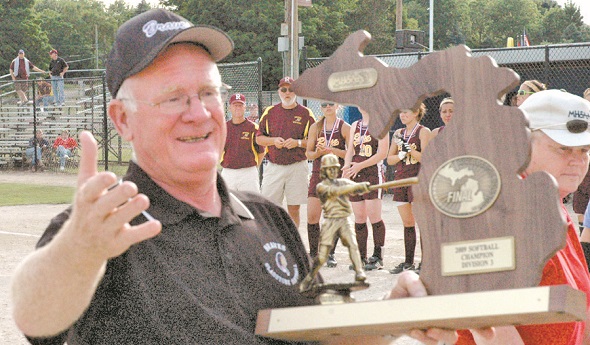
Gladstone Coach Smith Built Champions
October 24, 2016
By Dennis Grall
Special for Second Half
ESCANABA — Gerry Smith put his life into helping area youngsters get a foot into the athletic doorway, and in the process touched the lives of so many people.
 “Smitty” died Oct. 15 following a lengthy illness.
“Smitty” died Oct. 15 following a lengthy illness.
“God got a great softball coach,” said retired Gladstone athletic director Matt Houle. “He was unique and old school, but his love for kids and the game always showed clearly. He had such a passion for the game of softball and just loved working with kids.”
Smith, 70, worked at Mead Paper Co. for more than 30 years and was IBEW 979’s business agent for 21 years. But he will perhaps be most remembered for his 43 years on softball and baseball fields throughout the area. He spent 11 years as Gladstone High School’s head softball coach, directing the Braves to MHSAA titles in 2004 and 2009. He was 290-77-1, but missed much of the 2008 season because of shoulder surgery. The Braves were 31-10 under interim manager John Malloch, which would give Smith an overall 321-87-1 record.
 “He put a lot of trust into people he asked to help him out,” said Ashley Hughes, who succeeded Smith in 2014 and guided the Braves to the MHSAA Division 3 title that year.
“He put a lot of trust into people he asked to help him out,” said Ashley Hughes, who succeeded Smith in 2014 and guided the Braves to the MHSAA Division 3 title that year.
Hughes, who joined Smith on the softball staff when she became a teacher at her alma mater in 2009, also pitched for Smith and the Braves before getting a softball scholarship to Lake Superior State University.
She recalled Smith sought her services when she returned to Gladstone. “Hey kiddo, how about helping us out this year,” is how Hughes remembers that conversation.
He then told her, “I’m going to teach you everything I know and in a few years this will all be yours,” Hughes related.
“For me to come as head coach after Smitty, there was so much pressure. I wanted to live up to everything he had provided for this program,” Hughes said. “I didn’t want to disappoint him. He put a lot of faith in me.”
She said Smith also had an impact when she was a player. “He was so in your face in such a positive light. He wanted you to be successful, whether you had never touched a ball or had the ability to go on to play college ball. He was a spit-fire. He was so intense.
“He just exuded passion, at practice, at games. He had so much love for the game. That is something I’ve held onto because I too loved that game. To have someone like Smitty be so passionate and intense helped me become passionate and gave me the drive to be like that.”
Bill Buchmiller and Smith were partners for 40 years and he became godfather to Buchmiller’s children. In addition to guiding the Braves’ high school varsity, they served as American Legion coaches in the early stages of Gladstone’s program, worked together as Little League coaches and were softball teammates.
“He took a program from nothing to two state championships,” said Buchmiller. “He always encouraged the group. He may have broke them down a little bit but he always built them back up. He was a hard guy to get to know, but once you got to know him, he was a great guy.”
Smith used the knowledge he had gleaned from many years as a player and infused that into his players. “He just dwelled on the basics of softball. If you had to play small ball to win, that is what he played,” said Buchmiller.
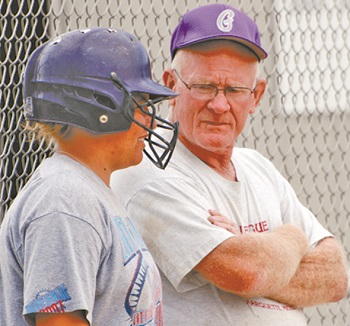 “He covered all the different bases of softball. He stressed defense. He told (hitting coach) Al Verbrigghe, ‘You give me one run Al and we’ll win the ball game with my defense. Give me a run and we’ll manage somehow.’”
“He covered all the different bases of softball. He stressed defense. He told (hitting coach) Al Verbrigghe, ‘You give me one run Al and we’ll win the ball game with my defense. Give me a run and we’ll manage somehow.’”
Theresa Shepeck, who joined Smith on the GHS staff in 2003, agreed with that assessment.
“Smitty always thought the short game was the way to go,” she said. “It was about bunting, not the long ball. You get a runner on one, you bunt her to two. You get somebody on three, then you suicide (bunt) her home.”
Shepeck said his players thrived on his various idiosyncrasies, such as finding tourney lodging in rather inexpensive motels and using a wad of cash to pay for the team’s rooms. “The kids just yukked it up,” she said with a laugh.
“He always put the kids first. If somebody made a mistake, it was never their fault; it is my (Smith’s) fault, the coaching staff’s fault. If one of us coaches made a mistake, he took that blame. It was always his fault, his responsibility,” said Shepeck.
The players appreciated how he used them in games and practices. “His philosophy was to put the best nine on the field, period,” she said. “He walked on a lot of toes, he had a lot of hurt feelings (of parents), but I think the kids respected that. Nobody ever doubted how they fit in. He was there to win.
“He was a little man (about 5-foot-6) but had a huge heart. He was all about the kids and the coaching staff. It was an honor to learn from him, to be in his presence, to be a mentor to the kids.”
Hughes agreed, noting “he had a way of figuring out what the team needs are and re-arranging the players (duties). He knew the players’ strengths and was always looking out for the entire team.”
Smith’s career record likely could have included more wins if he didn’t use the season’s first month to shuffle personnel while building for the postseason. It paid off when it counted the most as the Braves reached at least the Quarterfinal level each of his 11 seasons.
“He was definitely not afraid to experiment,” said Hughes. “He knew the rules of the game and he was always looking for more (from his players). He was an aggressive coach, and the girls who love the sport really grasped at that. He utilized every player on his roster.
“He didn’t have to say too much, but you always wanted to answer him and make him proud and prove to him that you can come through.”
Houle summed up Smith’s legacy when he said, “He was the person that put Gladstone High School on the map in high school activities. He will be dearly missed by so many. He touched so many lives.”
 Denny Grall retired in 2012 after 39 years at the Escanaba Daily Press and four at the Green Bay Press-Gazette, plus 15 months for WLST radio in Escanaba; he served as the Daily Press sports editor from 1970-80 and again from 1984-2012. Grall was inducted into the Upper Peninsula Sports Hall of Fame in 2002 and serves as its executive secretary. E-mail him at [email protected] with story ideas for the Upper Peninsula.
Denny Grall retired in 2012 after 39 years at the Escanaba Daily Press and four at the Green Bay Press-Gazette, plus 15 months for WLST radio in Escanaba; he served as the Daily Press sports editor from 1970-80 and again from 1984-2012. Grall was inducted into the Upper Peninsula Sports Hall of Fame in 2002 and serves as its executive secretary. E-mail him at [email protected] with story ideas for the Upper Peninsula.
PHOTOS: (Top) Gladstone High School softball manager Gerry Smith holds the Division 3 championship trophy after the Braves won the 2009 title in Battle Creek. Smith, who also led the Braves to the 2004 crown, died Oct. 15. (Middle) Smith talks with catcher Jordan Kowalski at a practice prior to the 2011 Division 3 Semifinals. (Photos courtesy of Escanaba Daily Press.)
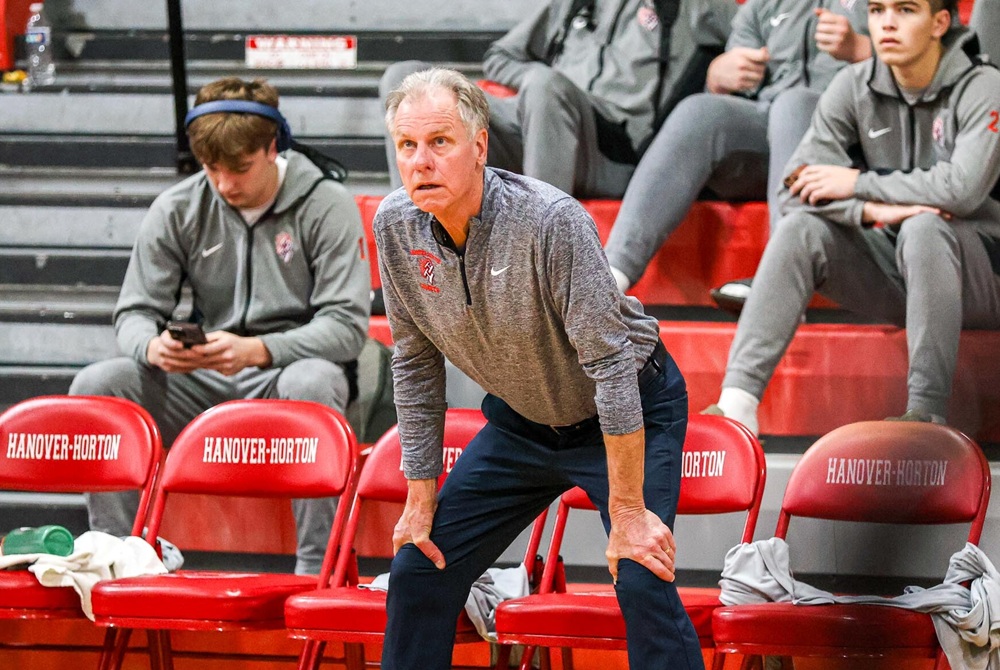
200 Wins Later, Lusk's 'Yes' Still Paying Off as Hanover-Horton Surges
By
Doug Donnelly
Special for MHSAA.com
February 3, 2026
Joe Lusk has had to be talked into coaching a couple of times.
But that hasn’t stopped him from being a winner.
 The Hanover-Horton girls basketball coach picked up career victory No. 200 last week when the Comets improved to 12-1 with a victory over Homer. It’s the best start to the season for Hanover-Horton since girls basketball transitioned from a fall sport to winter two decades ago.
The Hanover-Horton girls basketball coach picked up career victory No. 200 last week when the Comets improved to 12-1 with a victory over Homer. It’s the best start to the season for Hanover-Horton since girls basketball transitioned from a fall sport to winter two decades ago.
“He holds his girls accountable and wants to get the best out of each and every one of them,” said Comets athletic director Chris VanEpps. “We are very lucky to have him here at Hanover-Horton.”
Lusk’s career spans two Cascades Conference schools – his alma mater Michigan Center, and Hanover-Horton for the past five seasons. He was also on the bench at Michigan Center when the Cardinals enjoyed incredible success under coach Scott Furman.
Lusk’s story isn’t the typical one about a high school athlete growing up wanting to be a coach. The Consumers Energy retiree, in fact, never considered coaching basketball until his daughter Courtney came home one day and told him he was coaching her team.
“She was in the fifth grade,” Joe Lusk said. “She told me there was a tournament at Vandercook Lake, she was playing and I was going to coach. I told her no way.”
That no slowly turned into a yes.
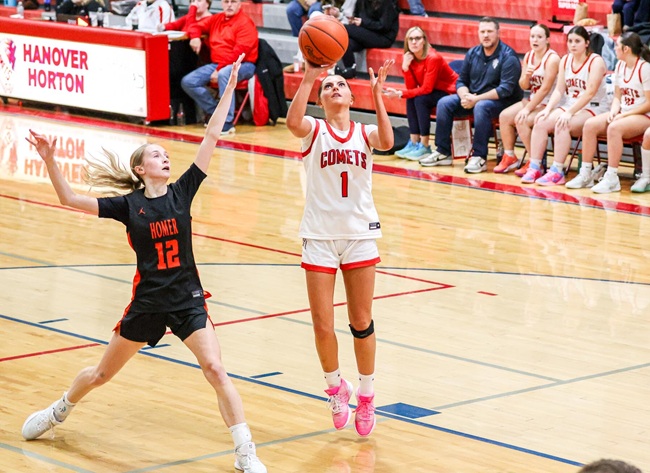 After coaching the youth basketball team for several years, Lusk was asked by Furman to join his varsity staff.
After coaching the youth basketball team for several years, Lusk was asked by Furman to join his varsity staff.
“He probably asked me 20 times,” Lusk said. “I kept telling him no. Ten years later, I was still coaching.”
Courtney grew into a varsity player and Lusk became an assistant coach.
“The joke at our house was she was either going to be a good basketball player or she was going to be in therapy,” Lusk said. “She would come home after a tough game and say, ‘Is tonight a therapy night?’”
Not much therapy was needed. The Cardinals went through a remarkable run during which they reached the MHSAA Finals twice and Semifinals another season before Courtney graduated in 2006.
Joe Lusk remained an assistant but, in 2012, Furman died, shocking the Michigan Center community. The ultra-successful coach had won more than 350 games during his career. Lusk took over the job, although he had reservations about becoming head coach.
Over the next nine seasons those reservations were put to rest as the Cardinals won 149 games. In 2018, they went 23-3 and made a run to the Division 3 Semifinals.
Lusk’s last season at Michigan Center was 2020-21. In June 2021, he was hired at Hanover-Horton.
“They found out there was an opening at Hanover and my wife (Cindy) and Courtney put together my resume and sent it in,” Lusk said. “They told me they were doing it. They wouldn’t let me quit (coaching).”
He was hired.
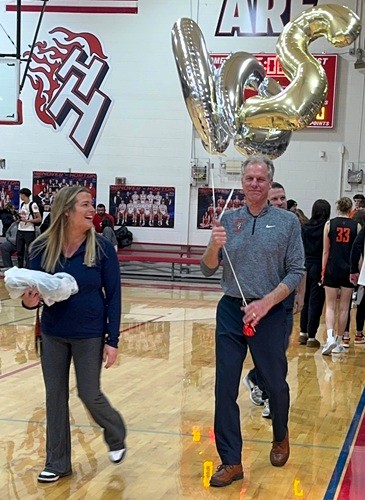 “Having an experienced coach like Coach Lusk is very important for our program,” VanEpps said. “His consistency and effort to make things better, not just for his teams, but for Hanover-Horton in general, give our younger staff someone to model themselves after. As for the girls on his team, he is stern but fair, which is something that can be lost on our younger generations.”
“Having an experienced coach like Coach Lusk is very important for our program,” VanEpps said. “His consistency and effort to make things better, not just for his teams, but for Hanover-Horton in general, give our younger staff someone to model themselves after. As for the girls on his team, he is stern but fair, which is something that can be lost on our younger generations.”
As for his current team being 12-1, Lusk knows the Comets have difficult games coming up. The Comets face Michigan Center (12-2) on Wednesday, Brooklyn Columbia Central (9-2) in a Cascades Conference West game in two weeks and state-ranked Concord in a nonconference matchup. Hanover-Horton also is in a District with powerhouses like Jackson Lumen Christi and Grass Lake. If the Comets win the Cascades West, they will likely face Grass Lake in the conference title game.
“We know the second half of our schedule is loaded,” he said.
Through it all, basketball remains a family sport. Courtney is the Comets’ junior varsity coach. Cindy keeps the scorebook for every game, something she has done for years.
“We are a basketball family,” Lusk said. “If Cindy didn’t do what she does, I wouldn’t be here today. She does a lot of work. For our juniors program, she keeps track of everything, all of the kids, what their shirt sizes are. If I had to do all of that, I wouldn’t be doing it. She loves basketball.”
 Doug Donnelly has served as a news and sports reporter at the Adrian Daily Telegram and the Monroe News for 30 years, including 10 years as city editor in Monroe. He's written a book on high school basketball in Monroe County and compiles record books for various schools in southeast Michigan. He is now publisher and editor of The Blissfield Advance, a weekly newspaper. E-mail him at [email protected] with story ideas for Jackson, Washtenaw, Hillsdale, Lenawee and Monroe counties.
Doug Donnelly has served as a news and sports reporter at the Adrian Daily Telegram and the Monroe News for 30 years, including 10 years as city editor in Monroe. He's written a book on high school basketball in Monroe County and compiles record books for various schools in southeast Michigan. He is now publisher and editor of The Blissfield Advance, a weekly newspaper. E-mail him at [email protected] with story ideas for Jackson, Washtenaw, Hillsdale, Lenawee and Monroe counties.
PHOTOS (Top) Hanover-Horton girls basketball coach Joe Lusk monitors the action during a game this season. (Middle) Lila Hamisfar (1) puts up a shot against Homer. (Below) Lusk carries balloons celebrating his 200th win alongside Hanover-Horton teacher and basketball parent Courtney Toteff. (Top and middle photos by Hannah Tacy/JTV. Below photo courtesy of Cindy Lusk.)

